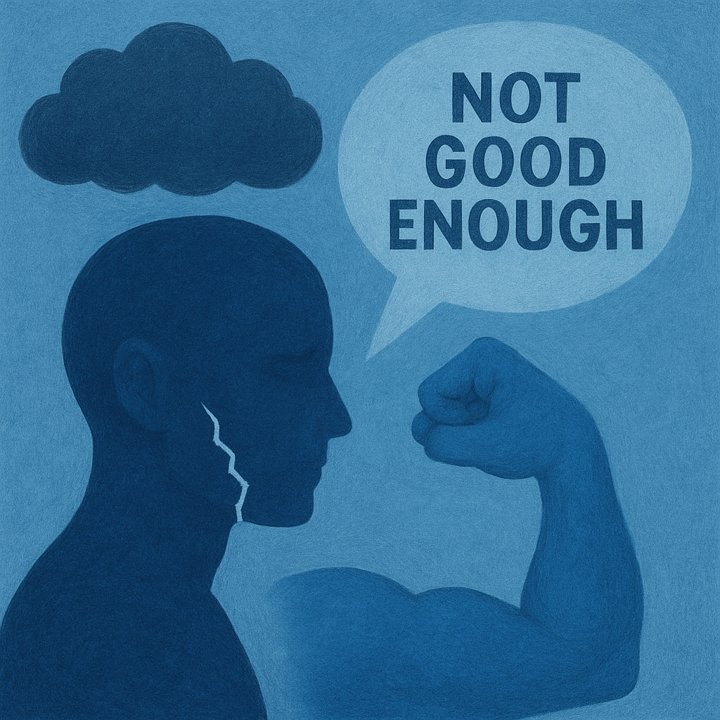Breaking the Cycle: How Therapy Helps You Challenge Depression-Driven Self-Criticism
Many men come into therapy describing a quiet but relentless internal pressure—the sense that they should be doing better, achieving more, or performing at a higher level. Even when they are objectively successful, they often struggle to feel good enough. This ongoing self-criticism is not a character flaw. It is frequently a core feature of depression, especially in men who have learned to turn distress inward rather than reach outward for support.
In my work with men in San Francisco, I see how deeply this critical inner voice affects identity, self-esteem, relationships, and emotional wellbeing. Depression does not always announce itself as sadness. More often, it shows up as a harsh internal monologue that never seems to quiet down.
The Hidden Voice of Depression
Depression often operates not as a mood but as a narrative—a steady stream of thoughts telling you that you’re not measuring up. Research has shown that self-critical thinking patterns are strongly associated with depressive symptoms and can maintain or worsen them over time (Blatt, 2004; Gilbert & Irons, 2005).
This internal voice might say things like:
“I can’t seem to get anything right.”
“Everyone else handles life better than I do.”
“I’m failing—other people have it worse, so I shouldn’t complain.”
Over time, this kind of self-talk erodes confidence, numbs motivation, and leaves men feeling isolated—even when they appear to be functioning well on the outside. It becomes difficult to acknowledge accomplishments, accept support, or feel connected to others.
What makes this voice so powerful is that it sounds rational. But it is not truth—it is a symptom of depression, shaped by earlier experiences, expectations, and internalized pressures.
Why Men Are Especially Vulnerable to Self-Criticism
Many men grow up absorbing cultural messages that emotional vulnerability is dangerous, weakness, or something to avoid. Expressions like “pull yourself together,” “be strong,” or “handle it on your own” teach boys to suppress pain instead of understanding it.
Research on gender socialization shows that men are more likely to internalize distress through self-blame, emotional numbing, perfectionism, or overachievement rather than through overt sadness (Addis & Mahalik, 2003). As a result, the depression that follows often becomes invisible—even to the person experiencing it.
Internally, it may look like:
pushing through exhaustion
working harder to avoid feelings
hiding struggles from loved ones
holding themselves to impossible standards
feeling like they must “fix” everything alone
From the outside, they may appear composed or productive.
Inside, they feel like they are fighting a private battle with themselves.
Therapy offers an alternative—a space where strength comes from understanding, not suppressing.
How Therapy Helps You Challenge the Inner Critic
The goal is not to silence the inner critic instantly. It’s to understand where the voice comes from, what it tries to protect you from, and how to develop a more grounded and compassionate internal dialogue.
In therapy, men learn to:
1. Recognize the Pattern
Noticing when self-criticism appears is the first step.
Many men move through their day unaware that their internal voice is harsh, unreasonable, or overwhelming. Therapy slows down the process so that these patterns become visible—and therefore changeable.
2. Understand the Origins
Self-criticism is rarely random. It often forms early in life through:
high expectations
conditional approval
emotionally distant caregivers
perfectionistic environments
family cultures that valued achievement over emotion
criticism or shame during childhood
Psychodynamic therapy helps men explore these origins not as blame but as understanding—recognizing how old emotional lessons shape the present.
3. Challenge Distorted Beliefs
Depression fuels cognitive distortions:
“I should be better.”
“I’m failing.”
“I’m disappointing everyone.”
Therapy helps men test these beliefs with reality rather than emotion. Over time, they learn to differentiate between their authentic voice and the depressive voice that distorts perception.
4. Develop a New Internal Voice
As awareness grows, men begin to cultivate an internal dialogue that is:
realistic
supportive
balanced
compassionate
This shift is not about “positive thinking.” It is about developing a voice that acknowledges struggle without collapsing into shame—what research describes as self-compassion, which has been shown to buffer against depression and improve emotional resilience (Neff, 2003).
What Changes When the Inner Critic Softens
When men begin addressing depression-driven self-criticism, they often describe profound internal shifts:
feeling less overwhelmed by mistakes
increased confidence
more ease in relationships
reduced pressure to perform perfectly
greater emotional connection
the ability to rest without guilt
improved self-worth
They stop relating to themselves as an adversary and begin relating as someone deserving of care.
This is not weakness—it is emotional strength.
A Call to Men Ready to Change Their Inner Narrative
If you’re living with relentless internal pressure, you do not have to manage it alone.
Therapy helps men understand the deeper layers of their self-criticism, challenge depressive thinking, and develop a more grounded, compassionate relationship with themselves.
You are not failing.
You are not alone.
And you are not defined by the voice of depression.
If you’re ready to explore a different way of relating to yourself, therapy for men in San Francisco can help you begin that process with clarity, support, and understanding.


